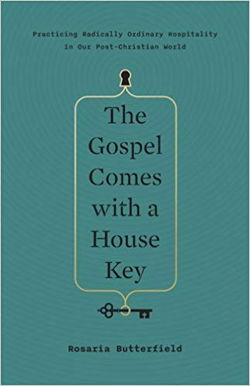
Rosaria Butterfield is no standard-issue, pastor’s wife, stay-at-home mom. She came to Christ as an English professor in a long-term lesbian relationship and would have stayed there quite happily were it not for her “train-wreck” conversion (see her first book, The Secret Thoughts of an Unlikely Convert, for that story). Much of her old life died. But at least three things lived on: her penetrating mind, her knack with words, and the hospitality practices she honed in the LGBT community.
 The Gospel Comes with a House Key: Practicing Radically Ordinary Hospitality in Our Post-Christian World is an exposition of Christ-centered welcome. It is moving and challenging and its author does not just walk the walk, she walks the dog of her meth-brewing neighbor while he’s serving time.
The Gospel Comes with a House Key: Practicing Radically Ordinary Hospitality in Our Post-Christian World is an exposition of Christ-centered welcome. It is moving and challenging and its author does not just walk the walk, she walks the dog of her meth-brewing neighbor while he’s serving time.
I got to experience the Butterfields’ radically-ordinary hospitality first-hand before reading the book. I met Rosaria last August. I told a friend that I was going to North Carolina for a conference. She asked if I knew Rosaria and put us in touch, and Rosaria invited me — a total stranger — to stay at her house.
Rosaria does not suffer self-righteous fools. But she suffers pretty much everyone else. Scrap that: she loves them. She does their laundry, watches their kids, cooks their food, and visits them in prison. Reading her book is like drinking a triple espresso. It won’t just wake you. It will kick your comfortable, self-loving, self-protecting butt.
In this excellent hymn sheet for Monday-through-Saturday worship, there is the occasional note that I can’t quite sing. The book is a little too prescriptive about what life should look like for women who are also wives and mothers. I get where this comes from: Rosaria sees all the opportunities she has as a homeschooling mother of multiple adopted kids, and all the space she is able to make for others because she’s not working a conventional job. She believes (as do I) that the Bible calls men and women to distinct roles in marriage, and her professional work (for example, writing this excellent book) can be accomplished around the edges of her home-centered day job. I thoroughly admire Rosaria and the choices she has made. But while many mothers are called to home-centered work, I believe that others are called to spend much of their working week outside the home.
Does working paid day jobs let us off the hook of “radically ordinary hospitality”? Not at all. Professional women (and men, for that matter) are not released from the call to hospitality. But as we spend more time outside the home, we must consider how hospitality applies in our working environments.
Here are 5 applications of Rosaria’s book for professional women:
- Invite people over. Despite our day jobs, we can still welcome others into our homes. This isn’t just for families — single women can create community in their living spaces, inviting friends and neighbors in. Don’t assume your singleness makes your home less usable by God. Likewise, those of us who are married should not see our marriages and our children as gold to be hoarded but gifts for the blessing of others. Our houses aren’t ours. Our money isn’t ours. Our food isn’t ours. All these things belong to Christ. We steward them for his glory. And the nuclear family should always be a magnet to draw others in, not a fence to keep them out.
- Share your connections. Just as we can welcome others into our homes, we can also invite them into our networks. I met Rosaria because a friend who knew us both introduced me. If, like me, you have networks thanks to various forms of privilege, how can you leverage those networks to advance talented people who don’t have those advantages? Inviting others into your networks and advocating for their work is a form of hospitality.
- Champion your colleagues. How can you challenge and encourage others in your workplace? For many, a little professional nourishment goes a long way, and mentorship by someone who believes in them can be a huge blessing. Are you known in your workplace as someone who invests in others? Do you care about their professional growth and their personal wellbeing?
- Spend sacrificially. How will you answer to the Lord for your use of your money? Are those of us who are working outside the home justifying more comforts and luxuries for ourselves because we are calibrated by our professional peers? A few years ago, I asked a friend in a highly paid profession if her colleagues gave much money away. She said no. Why? Because half their friends earn twice what they do, so they do not realize they are rich. We can cook food for people in our homes and share the gospel with them as Rosaria does. But we can also support others who minister to physical and spiritual needs in the US and abroad — and it should cost us.
- Worship purposefully. Do you see Sunday worship as a chance for hospitality? Do we see this as our private time with the Lord, our time to connect with friends, or our opportunity to welcome others in? I recently wrote a piece on this for CT Women entitled, “5 reasons I don’t sit with my husband in church” where I unpack this further, but Sunday morning is a key opportunity for all of us to apply the principles Rosaria outlines in small but potentially life-changing ways. If you consider your church your home, are you taking responsibility for welcoming others in?
Don’t get me wrong. Working outside the home — particularly while nurturing a marriage and raising kids — is demanding. We don’t glorify God by slacking on our work or ignoring our families and there will be many things we’ll have to say “no” to. But, Rosaria reminds us that the gospel comes with a key to our houses, access to our networks, and claims on our time; and it unlocks spiritual mansions. Let’s not miss out on the party.